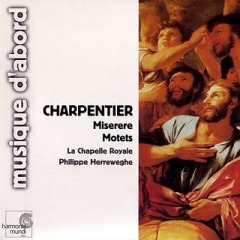Charpentier – Miserere – Motets (Herreweghe) [2002]
Charpentier – Miserere – Motets (Herreweghe) [2002]

1. Miserere H.219 - I. Ouverture
2. Miserere H.219 - II. Miserere mei, Deus
3. Miserere H.219 - III. Quoniam iniquitatem meam
4. Miserere H.219 - IV. Asperges me hysopo
5. Miserere H.219 - V. Ne projicias me
6. Miserere H.219 - VI. Sacrificium Deo
7. Miserere H.219 - VII. Benigne fac, Domine
8. Pour la seconde fois que le Saint Sacrement vient au mesme reposoir H.372
9. Pour le Saint Sacrement au reposoir H.346
10. Motet pour l'offertoire de la Messe rouge H.434 - I. Paravit Dominus
11. Motet pour l'offertoire de la Messe rouge H.434 - II. Pluet super peccatores
12. Motet pour l'offertoire de la Messe rouge H.434 - III. Deus justus et patiens
13. Motet pour l'offertoire de la Messe rouge H.434 - IV. Justus es Domine
Agnes Mellon, soprano
Isabelle Poulenard, soprano
Henri Ledroit, countertenor
William Kendall, tenor
Peter Kooy, bass
La Chapelle Royale
Philippe Herreweghe – conductor
Recorded: May 1985, Studio 103, La Maison de Radio, France
Released: 2002, Harmonia Mundi HMA 1951185
Only one of four pieces in this anthology of sacred vocal music by Charpentier has previously been issued on LP—and that was a very long time ago. The beautiful little motet Oculi omnium in te sperant Domine, "pour le Saint Sacrement au reposoir", was amongst a group of Charpentier's works conducted by Louis Martini and recorded by Erato in 1953 (never generally available in the UK). That issue, which included, the 'famous Te Deum, and another, directed by Boulanger, of excerpts from the tragedie-lyrique, Macke (Brunswick mono AXTL1049, 7/54—nla), may be justly regarded as the opening salvo in the rehabilitation of Charpentier by the record companies.
Both the Oculi omnium and O Deus, O salvator nosier were written for the traditional processions commemorating the Feast of Corpus Christi. They are striking pieces, mainly on account of their expressive intensity and in that achievement which we now recognize in Charpentier a great master. The more remarkable of the two is, perhaps, the Oculi omnium, where Charpentier creates an atmosphere of deep pathos with extraordinary concision of technique. It's a work of haunting beauty—a microcosm of the composer's meditative style.
The most elaborate and stylistically varied of the pieces is Paravit Dominus, "pour l'offertoire de la Messe Rouge". Scored for five soloists, fourpart choir, flutes, oboes, bassoon, organ and strings, it seems to have been intended for performance during the Mass celebrating the opening of the Paris Parliament in the autumn. It's a late work belonging to Charpentier's years as maitre de musique at the Sainte Chapelle. If the Oculi omnium may be said to be a microcosm of Charpentier's meditative vocabulary, then this motet is no less a miniature compendium both of his sacred and secular styles. The versatility with which the composer merges an extensive range of forms and effects drawn from his knowledge of theatre and church creates a fascinating kaleidoscope whose colours are as uniquely Charpentier's as those of Rameau, for example, are unmistakably his.
The Miserere, which probably dates from the 1690s, is scored for four-part orchestra and chorus with five soloists. Its opening Prelude for strings, is poignantly affecting as, indeed, are the quietly fervent choruses. The solo element is an important one but I did not always feel that the singers voiced their music as confidently as they might. Henri Ledroit is a little unsteady at times though William Kendall, after a hesitant start, settles very well into his part. For the most part though these are convincing performances of music which contains majesty and quiet grandeur—the other side of the grand siècle coin, if you like, and at least as representative of it as the ceremonial splashes of colour which characterize the music for the royal chapel. The recorded sound is effectively resonant in both LP and CD formats. Presentation and full texts are included in both. Warmly recommended. ---Editorial Reviews.
download: uploaded anonfiles mega 4shared mixturecloud yandex mediafire solidfiles
Last Updated (Monday, 30 September 2013 18:54)








